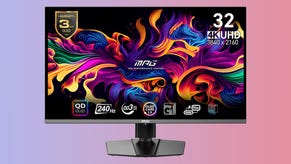AMD 4800S Desktop Kit review: playing PC games on the Xbox Series X CPU
Repurposed Xbox silicon powers a fascinating China-only PC motherboard.
For our first foray into AMD 4800S Desktop Kit testing, we decided to plug in the hardware into our existing CPU database, offering up as much competitive data as we could against today's market of processors. What we found was not exactly surprising - today's tech is based around Ryzen 7000 and Intel 12th-gen and 13th-gen Core processors working with fast DDR5 memory. A cursory glance at the page reveals that it's routinely possible for today's mainstream chips to double the performance of the 4800S.
What we needed to do was to put the CPU into context of its peers, so to begin, we also benched the Ryzen 5 3600. This is a six-core, 12-thread processor from AMD's Zen 2 generation - so it has much in common with the 4800S from an architectural standpoint. However, it does have a radically larger cache, so we also added a second processor to the mix: the Ryzen 7 Pro 4750G. This is basically a desktop version of the 'Renoir' chip found in Ryzen 4000 laptops and it's noteworthy in that it accurately reflects the 4800S in terms of its cache hierarcy, its core and thread counts and seemingly, even its clock speeds too. In fact, all of the Zen 2 chips we have seem to boost to circa 4.0GHz in gaming loads.
All tests are customised for high CPU utilisation, and we're typically benching at 1080p or upscaled 1080p using Nvidia DLSS (though we added 1440p variants too). To introduce a preposterously high GPU limit, we used an Nvidia RTX 3090 graphics card, ensuring that in these tests at least, all performance data is CPU-limited. The Ryzen 5 3600 and Ryzen 7 4750G were benched with 3600MT/s DDR4, while the modern platforms use a combination of 5200MT/s and 6000MT/s DDR5.
We cannot rule out that the limited PCI Express bandwidth on the 4800S may influence results. However, I'm inclined to think this is not the case - as looking at the frame-times, we see parallel results in Zen 2 tests, simply with various levels of offset depending on the chip. Not only that, but the 4750G almost always sits at a mid-point between 4800S and 3600 - and there are no PCI Express limitations on the 4750G that we're aware of.
Call of Duty Black Ops: Cold War
The Fracture Jaw level of Black Ops Cold War can push CPUs hard and it's interesting to note that this level does not have RT active on the console versions, even though it is active elsewhere in the game. Even so, it's initially a good result for the 4800S. You can see that there's no real difference between 4800S and Ryzen 5 3600 - the latter only delivering a 2.23 percent advantage over the course of the bench at 1080p.
And while the Ryzen 7 Pro 4750G does push ahead, on average it's only around six percentage points ahead of the 4800S desktop kit. Initially at least then, validation that the 3600 is a pretty good mainstream counterpart to the console CPUs but man, the latest generation of CPU paired with decent RAM is so far ahead. A Ryzen 5 5600X is around 20 percentage points ahead, but the new Ryzen 5 7600 with fast memory doubles that advantage - and this is just the beginning.
Call of Duty: Black Ops Cold War: DX12, Low, TAA
Crysis 3 Remastered
The deltas between the various CPUs change on a game-by-game basis though, even just restricting ourselves to the Zen 2 family. Moving onto Crysis 3 Remastered, the difference between the three Zen 2 chips changes quite drastically according to content but ultimately the 4750G is much like the 4800S, though this time it's seven percent to the better on aggregate against the console CPU.
The Ryzen 5 3600 can be anything from 10 percent to 40 percent ahead of the 4800S depending on the scene, but average it all out and there's a 22 point lead for the 3600. Now we're seeing bigger differences and the 4800S is starting to lag behind, while comparisons with today's mainstream Ryzens are borderline shocking - both the 5600X and the 7600 are over twice as fast as the 4800S. You'll also note that if you're still on a Ryzen 5 3600, both Ryzen 5000 and 7000 CPUs are genuinely great upgrades.
Crysis 3 Remastered: Very High, DLSS Perf
Ashes of the Singularity: Escalation
The classic Ashes of the Singularity: Escalation CPU test concentrates on soaking multi-core set-ups and it's here where our three Zen 2 chips group up once again. The Ryzen 5 3600 only musters a 1.9 percent lead over the console-based 4800S, while the 4750G pushes ahead of both - it's just over six percent ahead of our Series X-based chip.
This one is as close as you're going to get to a synthetic benchmark in the gaming space, so it's no surprise to see the three Zen 2 processors this close - the 4800S and 4750G can finally push their extra two cores to the max up against the cache-rich Ryzen 5 3600. The benchmarks here also show how important memory bandwidth in the PC space can be, as we have the same chips tested across several memory speeds here.
Ashes of the Singularity: CPU Test
Metro Exodus Enhanced Edition
The situation looks pretty dire here in Metro Exodus Enhanced Edition, where astonishingly, the very close Ryzen 7 4750G commands a mammoth 44 percentage point lead over the 4800S, which is staggering when the core CPU architecture and indeed base frequencies are much the same. I can only assume that cache and more likely still latency are king on this one, as the lead extends to 68 points with Ryzen 5 3600.
By extension, this means that today's modern mainstream processors annihilate the console CPU, while roundly thrashing everything we have in the Zen 2 generation. For example, there's a 2.45 times multiplier just from the Ryzen 5 5600X and there's also a mammoth 2.38x performance uptick from a Core i5 12400F. We've been spoilt for choice in the mainstream CPU space the last couple of years with both AMD and Intel aggressively competing with one another.
Metro Exodus EE: DX12, Ultra, RTX, DLSS Performance
AMD 4800 Desktop Kit Analysis
- Introduction, Synthetic Benchmarks
- Benchmarks: COD BLOPS: Cold War, Crysis 3 Remastered, Ashes of the Singularity, Metro Exodus EE [This Page]
- Benchmarks: Counter Strike: Global Offensive, Cyberpunk 2077, Flight Simulator, Far Cry 6, Hitman 3
- Gameplay tests at console settings on RX 7900 XTX, Conclusion








